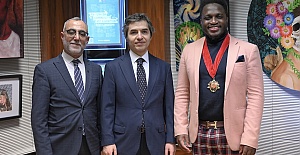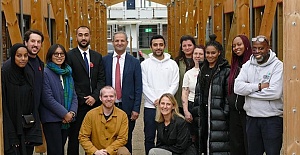Does transnational media consumption strengthen the ethnic and national belonging? My answer is no, especially in the case of the second generation. The second generation engage in transnational media in different ways which depends on their perceptions and thoughts about possible transnational media options, and it does not reinforce the ethnic and national identity. Young people might not choose to watch the television channels of the country of origin because they do not have the same attachments as their parents. Their Turkish media consumption does not help them to become more sensitive to their country of origin, to create or keep contacts with their relatives or friends in the country of origin, or help them be more involved in the Turkish and Kurdish speaking communities in London. This pattern signifies more the choice of their parents rather than individual construction of links with the country of origin. Watching Turkish television channels is a necessity in the case of these respondents. Their interest in media is focused on English television because it includes general issues about the everyday life, rather than individual problems as seen in Turkish television.
Though the second generation tends to develop a plurality of practices, some do not engage with transnational media consumption: some do not watch any transnational television, others watch only transnational television, and others watch both transnational and British television. Their consumption is influenced by different factors such as language, their links with the country of origin, and their level of social inclusion within the receiving society. For example, language might limit the engagement of second generation migrants with local and national media. If they are not able to understand Kurdish or Turkish television channels, their participation with them will be limited. The same is true for the use of the English language. Second generation migrants have a better command of English than their parents, which may affect their consumption of British media. Unlike their parents, young people often lack a direct relation with the country of origin, which may explain why their media consumption is not exclusively focused on the country of origin. As they experience the way of life and the socio-political issues of the country of origin only through the mediation of satellite television, this indirect link might allow them to be more critical towards the media, culture, way of life, etc. of the country of origin. Their relation to Turkish media is reflected only in Turkish cultural space, i.e. amongst their own community, with Turkish peers, parents, and people in the country of origin. Therefore, it is isolated from the rest of thecultural spaces which they interact with.
Watching English television seems to be a tool which is attached to the society they live in. It is a way to improve their language skills and learn about the politics and culture of the receiving society. They are more interested in what is happening in the UK, because they were raised in London. Like those people watching mostly Turkish television, these exclusive media choices show the difficulty Turkish, Kurdish and Turkish- Cypriot young people have in moving between aplurality of cultural references and using transnational media.Engaging with transnational media does not strengthen their national and cultural identity, but instead leads them to develop a critical perspective on both the host and sending countries. Their transnational media experiences construct diverse and mixed identity possibilities which are new and revised according to the circumstances.
Transnational Media: From Exclusive to Plural Practices
Does transnational media consumption strengthen the ethnic and national belonging
24 Haziran 2012 Pazar 09:23
reads.



 Prime Minister Keir Starmer's 2025 Easter message
Prime Minister Keir Starmer's 2025 Easter message After Nesil Caliskan a by-election will be held in Jubilee ward in Enfield
After Nesil Caliskan a by-election will be held in Jubilee ward in Enfield Publishing the analysis, Labour’s Cllr Ergin Erbil said Everybody in Enfield deserves basic rights
Publishing the analysis, Labour’s Cllr Ergin Erbil said Everybody in Enfield deserves basic rights Gaza-Israel conflict Statement from Cllr Ergin Erbil, Leader of Enfield Council
Gaza-Israel conflict Statement from Cllr Ergin Erbil, Leader of Enfield Council The European Union called on Turkey to uphold democratic values
The European Union called on Turkey to uphold democratic values Turkish citizens in London said Rights, Law, Justice
Turkish citizens in London said Rights, Law, Justice The Council of Turkish Cypriot Associations Geneva response letter
The Council of Turkish Cypriot Associations Geneva response letter Sustainable Development and ESG, Will This Become the Course for Turkic World
Sustainable Development and ESG, Will This Become the Course for Turkic World The 'Prince of Paris' has impressed in his first EuroLeague season
The 'Prince of Paris' has impressed in his first EuroLeague season Saran Media And Euroleague Basketball Extend Media Rights Partnership for Four More Years
Saran Media And Euroleague Basketball Extend Media Rights Partnership for Four More Years Will Rangers be Jose Mourinho’s next victim?
Will Rangers be Jose Mourinho’s next victim? Jose Mourinho's Fenerbahce face Rangers on Thursday
Jose Mourinho's Fenerbahce face Rangers on Thursday Barclays has become the biggest UK lender so far to cut mortgage rates
Barclays has become the biggest UK lender so far to cut mortgage rates THE SPRING STATEMENT EXPLAINED, UK ECONOMIC OUTLOOK AND GROWTH FORECASTS
THE SPRING STATEMENT EXPLAINED, UK ECONOMIC OUTLOOK AND GROWTH FORECASTS Launch of Made in Enfield gift shop to celebrate local artists and designers
Launch of Made in Enfield gift shop to celebrate local artists and designers Trial used smart Wi-Fi sensors for live building occupancy data to optimise
Trial used smart Wi-Fi sensors for live building occupancy data to optimise
















